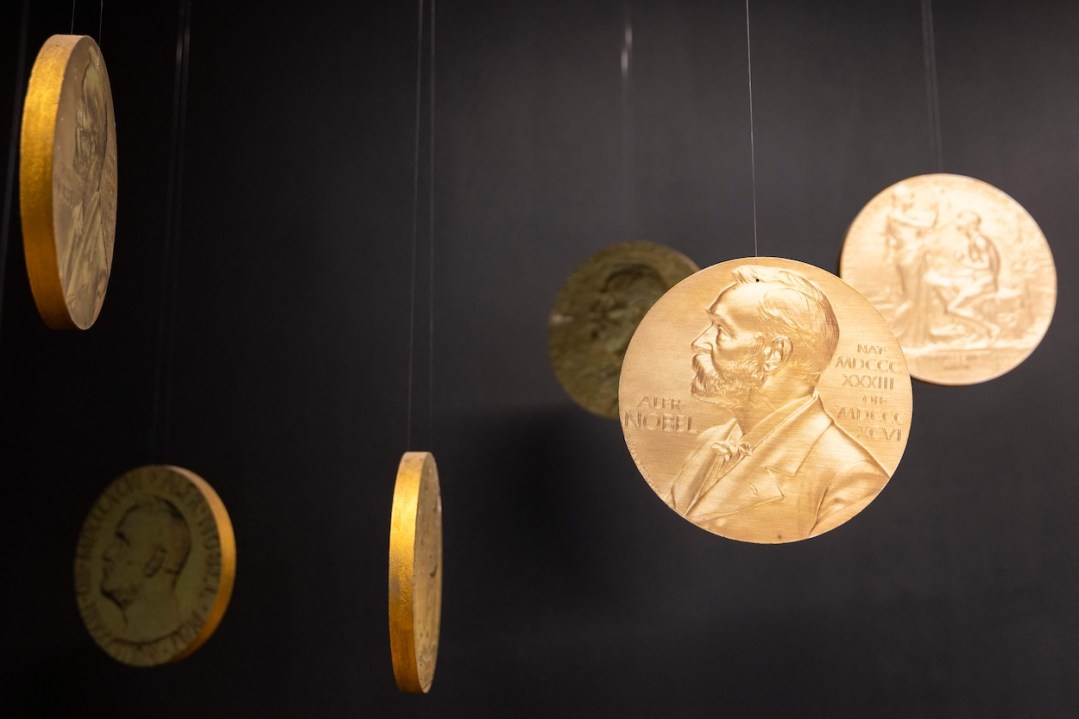To meet one winner of the Nobel Prize for Literature would be seen by most bookish nerds like me as a real privilege; to meet two as extraordinarily lucky; but to enjoy extended encounters with three is surely very heaven. Such, however, has been my fortunate fate.
The Nobel Prize for Literature is the world’s most prestigious – and, as it comes with a hefty cash bonus, the second most lucrative – award for fine writing. Inaugurated at the dawn of the 20th century by the Swedish industrialist and inventor of dynamite, Alfred Nobel (to atone for a lifetime manufacturing munitions) the prize is one of five awarded annually every autumn by the Swedish Academy. The others are for physics, chemistry, medicine and – most controversially – peace.
His MO was beating and strangling prostitutes with their own bras
Often criticised for Eurocentricity, for neglecting women and Third World writers, the Swedes have occasionally got it right (Yeats, Camus, Hemingway and Beckett), but have just as frequently missed big fish (Proust, Joyce, Hardy and Auden) in favour of obscure and little-read authors – often from Scandinavia itself. (Though they unaccountably failed to honour Strindberg or Ibsen when they were right under their noses). Graham Greene, though repeatedly nominated, never got Nobel lucky either, but Bob Dylan did.
Despite Greene’s omission, Britain hasn’t done too badly in the Nobel stakes, providing nine of the 120 laureates, including the youngest, Rudyard Kipling, at 41, and the oldest, Doris Lessing, at 88. The other seven Nobel-winning Brits are John Galsworthy, Bertrand Russell, Winston Churchill, T.S. Eliot, William Golding, Harold Pinter and Kazuo Ishiguro.
My meetings with Nobel laureates came before they had won the prize, but all three were already big names when we met. In the early 1990s, I was at a party in Vienna and was introduced to a woman holding court from a chair resembling a throne. By the deferential way that she was being treated by the other guests, I assumed that she was auditioning for the part of Empress ‘Sissi’ of Austria-Hungary in the musical of that name.
In fact, this imperious person was Elfriede Jelinek, a playwright and novelist who, in a country notorious for its neuroses, is even more nutty than other tortured Austrian authors. Jelinek was awarded her Nobel Prize in 2004 and is a classic Viennese intellectual. Her mother was a traditional Austrian Catholic while her father’s family was Jewish and Czech, Jelinek herself was a communist party member as late as 1991, and rails against men and patriarchy in her books, despite being married to a man.
Her most notable public error was to join other Austrian eggheads in agitating for the release from jail of Jack Unterweger, a murderer convicted of the brutal slaying of a young woman, who had turned to literature in prison, publishing his poetry in literary magazines. Jelinek and her pals reckoned they had discovered a new Jean Genet-style genius in jail and emulated Jean-Paul Sartre (who had pleaded to get Genet released) in petitioning Austria’s president to have Jack pardoned and freed.
They succeeded, but once Jack was out, he combined poetry readings in various provincial cities with more brutal murders. His MO was beating and strangling prostitutes with their own bras. It took the Austrian cops a while to make the link between Jack’s celebrity literary events and his killings, and they seemingly failed to notice the speed with which he turned up at the scenes of his own crimes in his new job as a radio reporter. By the time they had put two and two together, he had fled to the States to try to break into Hollywood. More stranglings in LA followed, until Jack was finally extradited back to Austria to stand trial.
On his first night back in jail, having been convicted of nine murders and sentenced to life without parole, Jack hanged himself, using the same unusual knot in his noose that he had used to kill his victims. It may seem strange and shameless that a self-proclaimed feminist like Jelinek should make such a woman-hating sadist as Jack Unterweger her favoured cause, but logic plays little part in her work, which has an unhealthy fascination with sexual violence. So much so that one Swedish academician resigned in protest when she won the Nobel, condemning her books as ‘chaotic pornography’. Another Jelinek mistake – or brave stand depending on your viewpoint – was her outspoken support for a fellow Austrian writer, Peter Handke, ostracised by world opinion since the 1990s for backing the Serbs and Slobodan Milosevic during and after the wars in former Yugoslavia.
Jelinek’s best-known novels are The Piano Teacher and Lust, both of which are replete with themes beloved of the nation that spawned Freud, Hitler, and Leopold von Sacher-Masoch: hatred of kids for their parents, the commodification of capitalism, suicide, the close connection between sex and death and love and hate, marriage, murder, music, and, of course, incest. Jane Austen it ain’t. I found it difficult to connect the hair-tearing violence of these works to the twitchy, nervous woman on her throne with her odd combination of fragility and arrogance.
She reminded me of ‘Bambi’ (itself another work of Viennese literature) and I was intrigued to discover later that ‘Jelinek’ is the Czech word for ‘little deer’. I expect we talked about the awfulness of Austrian society since that is her chief overriding theme. We must have disagreed about something, however, for she soon indicated that my audience time was over. Chastened, I retired to the outer darkness to lick my wounds.
My next Nobel meeting took place a decade later, soon after the Anglo-American invasion of Iraq. I had been invited to chair a literary meeting at Sussex University at which the guest of honour was Doris Lessing, doyenne of feminist fiction, who would get her Nobel rather late in the day in 2007. I had once corresponded with Lessing over our shared enthusiasm for the writer Patrick Hamilton, but had never met her in the flesh, and truth to tell was distinctly nervous about doing so.
We wound up sharing a taxi into Brighton for an Italian meal at the Al Duomo restaurant near the Pavilion
If Jelinek was auditioning for the part of an Empress, Lessing was little short of a Goddess. Physically, she resembled the Sioux Indian chief Sitting Bull, with her grey hair severely parted down the middle. Like Jelinek, as a young woman Lessing had been a committed communist, but at least had the decency to leave the party after the bloody Russian repression of the 1956 Hungarian revolution. Not wanting to wreck our cosy tête-à-tête, I forebore to inquire how an intelligent woman enraged by the moral crimes of imperialism could somehow have overlooked a corrupt system like Soviet communism, or excused a mass murdering monster like Stalin. Her many novels ranged in theme from women’s raw deal, the colonial Africa where she had grown up, to motherhood (controversially, Lessing had abandoned her two eldest children to be brought up by her first husband in Africa), sci-fi, and latterly Sufi religious mysticism.
She remained a leftist, and I was surprised by the fierce vehemence with which the old girl condemned the US atrocities in Iraq at the meeting. We wound up sharing a taxi into Brighton for an Italian meal at the Al Duomo restaurant near the Pavilion. I was as excited as a teenager on entering with my octogenarian date, and wondered whether Lessing would be recognised, but of course in post-literate Britain she wasn’t.
I found our leading lady of letters to be spiky, down to earth and honest. It was clear that she didn’t suffer fools gladly, or at all, so I did my best not to fall into that role. We mainly talked – as all writers great and small will do – of the iniquities of editors and the idiocy of publishers, including her own who had rejected one of her books at the height of her fame when she submitted it under a pseudonym.
My third Nobel-to-be encounter came a couple of years later in 2005 when I was sent by the Daily Mail Book Club to interview Kazuo Ishiguro, the Nagasaki-born novelist best known for his sensitive study of appeasement and repressed English emotions among the upper crust in The Remains of the Day. As a huge fan of both the novel and the film of the book starring Anthony Hopkins, I was delighted when the Mail chose Ishiguro’s very different sixth novel Never Let Me Go, a sci-fi tale about cloning, as its Book of the Month choice, and felt even more honoured to be interviewing the great man.
In fact, Ishiguro was modest to a fault, delightful, and completely unpretentious. He lived in a featureless and unfashionable London suburb so anonymous – Neasden? Walthamstow? Southfields? – that I have forgotten where it was. (This was well before the knighthood and Nobel had come his way in 2017, so he may have upgraded since).
He was so well-mannered that he didn’t even mock my technophobia when my tape recorder failed to function and I had to take written notes of the interview, merely signing my copy of the novel ‘To Nigel: the man with the malfunctioning tape recorder’. Having visited Japan, I was fascinated by how he had created a portrait of his native land in his first two novels before ever visiting it as an adult.
His formidable imagination was on display again in Remains when he entered the world of the English ruling class in the 1930s with the easy assurance of one to the manor born. Of my Nobel trio, Sir Kazuo was by far the nicest human being, and a perfect gentleman to boot.








Comments